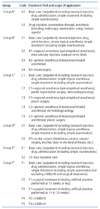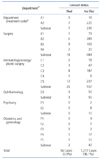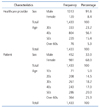1. Kim KH, Song DJ, Lee ES, Park MS, Ahn HR. Research on meditation strategy and reputation recovery particulars regarding medical accidents. Seoul: Korean Medical Association;2013.
2. Lee JC, Min HY, Kim KH, Kim HN. Factors associated with the malpractice settlement cost between doctors and patients in Korea. Health Soc Sci. 2010; 28:171–196.
3. Sohn MS, Min HY, Lee IH, Lee MJ. Total cost estimation of malpractice disputes in Korea. Korean J Med Law. 2005; 13:57–76.
4. Lee IH, Lee IO. Questionnaire study about responsible parties in medical malpractice. Korean J Med Law. 2005; 13:63–70.
5. Baicker K, Chandra A. Defensive medicine and disappearing doctors. Regulation. 2005; 28:24–31.
6. Stewart RM, Johnston J, Geoghegan K, Anthony T, Myers JG, Dent DL, Corneille MG, Danielson DS, Root HD, Pruitt BA Jr, Cohn SM. Trauma surgery malpractice risk: perception versus reality. Ann Surg. 2005; 241:969–975.
7. Choi HS. A study on the medical accident and malpractice relief aystem in Korea. Wonkwang J Law Res. 2010; 26:539–562.
8. Korea Consumer Agency. Annual report and casebook on consumer remedy damage. Seoul: Korea Consumer Agency;2011.
9. Shim JH, Lee KS, Shim JJ, Yoon SM, Doh JW, Bae HG. Analysis of precedents related to the medical accidents of neurosurgery. Korean J Neurotrauma. 2012; 8:32–36.

10. Nakajima K, Keyes C, Kuroyanagi T, Tatara K. Medical malpractice and legal resolution systems in Japan. JAMA. 2001; 285:1632–1640.

11. Yasunaga H. Legal intervention against medical accidents in Japan. Risk Manag Healthc Policy. 2008; 1:39–42.

13. Lee SI. Improvement of medical treatment quality through patient safety control. Seoul: Policy for Healthcare Facilities and Medicine;2012.
14. Min HY, Sohn MS, Kim KK. A rational scheme for medical malpractice compensation in OBGYN: focusing on a structural analysis by types. Korean J Med Law. 2004; 12:63–100.
15. Im BH. Analysis of medical disputes precedent. J Korea Contents Assoc. 2010; 10:294–303.

16. Korea Health Industry Development Institute. Medical resource statistics handbook [Internet]. Cheongju: Korea Health Industry Development Institute;2012. cited 2015 Mar 17. Available from:
http://khiss.go.kr/.
18. Hwang MS. The legal scheme for resolving conflicts between patients and physicians. Seoul: National Research Council for Economics, Humanities and Social Sciences Cooperative Research Studies;2005.
19. Shin EH. A study for analysis of the current status of medical disputes and the characteristics by medical department: centered on the data of 2006 Korea Consumer Agency. Seoul: Yonsei University;2007.
20. Korean Institute of Medicine. Strategy alternatives of malpractice prevention using the systematic analysis of medical service's type. Seoul: Korean Institute of Medicine;2003.
21. Asian Institute for Bioethics and Health Law. Research on medical malpractice prevention programs for foreign patients. Cheonju: Korea Health Industry Development Institute;2009.
22. Kim SH, Park HW. A study on preventive strategies of medical accident through analyzing medical disputes- centered on foreign patients. Korean J Med Law. 2012; 20:95–120.
23. Lee DY. Identifying causes of pediatric malpractice and developing measures to prevent recurrence through an analysis of court decisions on medical disputes in pediatrics [dissertation]. Seoul: Yonsei University;2014.
24. Kim JH. Current situation and related issues on medical malpractice: an approach form medical sociological perspective. Korean J Sociol. 1998; 32:395–426.
25. Cho BH. Attitudes of Taegu citizens on medical malpractice and conflicts. Korean Assoc Health Med Sociol. 1997; 2:85–105.
26. Kim EJ. Developing a process model for crisis management communication about medical dispute. Health Soc Welf Rev. 2012; 32:391–428.

27. Cho HS, Lee SH, Shon MS, Yang SH, Lee HR. Reasons why patients and families choose medical dispute. J Korean Acad Fam Med. 1998; 19:274–291.
28. You H. Civil liability for medical malpractice. J Korean Med Assoc. 2013; 56:648–654.

29. Rhee HS, Lee JH, Rhim KH, Choi MK. The thoughts of patients on medical accidents and disputes in Korea. Korean J Hosp Manage. 2006; 11:1–30.
30. Lee MK. The effects of apology and general trust on anger and forgiveness in medical malpractice [dissertation]. Seoul: Chung-Ang University;2011.
31. Beck RS, Daughtridge R, Sloane PD. Physician-patient communication in the primary care office: a systematic review. J Am Board Fam Pract. 2002; 15:25–38.
32. Beckman HB, Markakis KM, Suchman AL, Frankel RM. The doctor-patient relationship and malpractice: lessons from plaintiff depositions. Arch Intern Med. 1994; 154:1365–1370.

33. Levinson W, Roter DL, Mullooly JP, Dull VT, Frankel RM. Physician-patient communication. The relationship with malpractice claims among primary care physicians and surgeons. JAMA. 1997; 277:553–559.











 PDF
PDF ePub
ePub Citation
Citation Print
Print






 XML Download
XML Download